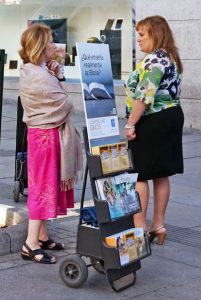 In Romans 10:1-3, Paul reveals something regarding his fellow Israelites which I believe applies equally to Jehovah’s Witnesses. “Brothers,” Paul says, “my heart’s desire and prayer to God for the Israelites is that they may be saved. For I can testify about them that they are zealous for God, but their zeal is not based on knowledge. Since they did not know the righteousness that comes from God and sought to establish their own, they did not submit to God’s righteousness.”
In Romans 10:1-3, Paul reveals something regarding his fellow Israelites which I believe applies equally to Jehovah’s Witnesses. “Brothers,” Paul says, “my heart’s desire and prayer to God for the Israelites is that they may be saved. For I can testify about them that they are zealous for God, but their zeal is not based on knowledge. Since they did not know the righteousness that comes from God and sought to establish their own, they did not submit to God’s righteousness.”
In saying that these Israelites “did not know the righteousness that comes from God,” Paul is not stating that they lacked knowledge of God’s righteous standards. The scribes and Pharisees were experts in God’s law. Nor is he saying that they had replaced God’s righteous standards with their own. In fact, he acknowledges that they were “zealous for God.”
So what did they do wrong? They tried to establish their own righteousness. But isn’t that a good thing, trying to be righteous, trying to prove to God that you will maintain your integrity and follow his laws? Isn’t that what Jehovah’s Witnesses think is necessary in order to obtain everlasting life?
What the Witnesses fail to realize is that there is no way human beings can ever by self-effort become righteous enough to meet God’s standards. If we try to establish our own righteousness—that is, if we try to generate sufficient righteousness by self-effort and dedication—we are thwarted at every turn by the dead spirits we inherited from Adam.
But this is exactly what the Watchtower insists they must do.
The Watchtower teaches that members of the great crowd are not part of the new covenant. Because they will not be receiving spirit bodies suited for heaven, they do not need to be born again.[1] The Watchtower specifically says, “The ‘great crowd’ of ‘other sheep’ that is forming today is not in that new covenant. However, by their associating with the ‘little flock’ of those yet in that covenant they come under benefits that flow from that new covenant.”[2]
Thus, without becoming part of the new covenant or receiving Christ’s righteousness, these Jehovah’s Witnesses must “exercise faith” in Christ’s ransom sacrifice through their works and thereby prove worthy on their own merit to survive Armageddon and enter the millennial kingdom.
The Watchtower explains what they will have to do to in order to prove worthy to enter the millennial kingdom:
The word ‘sanctification’ basically means ‘the act or process of making holy, separating, or setting apart for the service or use of Jehovah God; the state of being holy, sanctified, or purified.’ As early as 1938, The Watchtower stated that the Jonadabs, or other sheep, ‘must learn that consecration [dedication] and sanctification are required of each one who shall become a part of the great multitude and live on earth.’ In the vision of the great crowd, recorded in the book of Revelation, they are spoken of as having ‘washed their robes and made them white in the blood of the Lamb’ and as rendering Jehovah ‘sacred service day and night in his temple.’ (Revelation 7:9, 14, 15) With the help of the holy spirit, the other sheep do their utmost to measure up to Jehovah’s requirements of holiness.[3] (emphasis added).
The Witnesses do not understand that Jehovah’s standard is perfection, and that without Christ’s righteousness it is impossible to measure up.
I recommend that you ask Jehovah’s Witnesses what measure of holiness Jehovah’s expects of them in order to make it into the millennial kingdom. Ask them to show you this from the Bible.
Your turn:
Does this article help you understand why Jehovah’s Witnesses are always unsure of their own salvation?
Share your thoughts in the comments.
[1] Reasoning from the Scriptures, pp. 77-80
[2] The Watchtower, “Questions from Readers,” 4/1/79, p. 31
[3] The Watchtower, “Have You Received ‘the Spirit of the Truth’?”, 2/1/02, p. 21
(Photo by Tiia Monto [CC BY-SA 3.0 (https://creativecommons.org/licenses/by-sa/3.0)], via Wikimedia Commons)

Leave a Reply
Be the First to Comment!